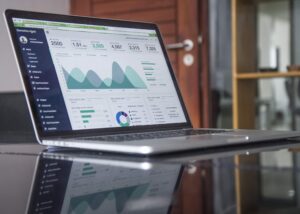In today’s hyper-connected world, we rely on the internet for almost everything. From shopping to socializing, all our activities are just a click away.
However, with this convenience comes a potential threat to our privacy: web tracking. Web tracking is the practice of collecting data about our online behavior for various purposes. While it can be beneficial in some cases, it poses a significant risk to your data privacy if not managed correctly.
In this blog post, we’ll explore the challenges of web tracking and provide you with practical tips on how to protect your sensitive information in a hyperconnected world. So sit back and join us as we navigate through this complex topic!
What is Web Tracking?
Web tracking refers to the practice of collecting data on a user’s online activities, including their browsing history, search queries, and even location. This information is used by companies for various purposes such as advertising, personalization of content and services or improving user experience.
Web tracking can be done in several ways, including using cookies that track web activity across multiple sites or through device fingerprinting which tracks unique characteristics of a device like hardware or software configuration.
These methods allow companies to build detailed profiles on users that help them provide targeted ads or design personalized products.
However, the downside is that this type of data collection can raise serious privacy concerns if it falls into the wrong hands. Not only does it leave users vulnerable to identity theft and fraud but also raises ethical questions about who has access to our personal information.
Therefore it is crucial for us as internet users to understand how web tracking works so we can take necessary measures to protect our data from being exploited by third parties.

How do Web Trackers Affect Your Privacy?
Web trackers are a ubiquitous element of the hyperconnected world we live in. These tools allow companies to gather user data on websites and apps for various purposes, from improving user experience to targeted advertising. However, web tracking can also have serious implications for your privacy.
Web trackers collect a range of data about your online behavior, including your browsing history, search queries, location information and more. This information is often shared with third-party advertisers or other entities without your knowledge or consent.
Even if you think you have nothing to hide, this kind of personal data can be used by cybercriminals for identity theft or other fraudulent activities. Additionally, the constant collection of sensitive information can lead to breaches that could threaten national security as well as individual privacy.
Ultimately, web tracking puts control over our personal data in the hands of corporations rather than individuals. As such it is important to understand how these technologies work and what steps you can take to protect yourself from unwanted surveillance and exploitation by third parties who may misuse that data against us without our permission or knowledge.
How to Protect Your Data from Web Tracking
In today’s hyperconnected world, web tracking has become a common practice that can lead to the misuse of our personal data. But there are ways to protect your data from being tracked online.
Firstly, consider using a Virtual Private Network (VPN) when surfing the internet. This encrypts your connection and hides your IP address, making it difficult for trackers to follow you around.
Secondly, adjust your browser settings by disabling third-party cookies or clearing them regularly. You could also use plugins like AdBlock Plus or Ghostery that block ads and trackers on websites.
Thirdly, be mindful of what information you share online. Avoid giving out sensitive details such as social security numbers or credit card information unless absolutely necessary.
Stay informed about web tracking trends and new privacy policies so you can take appropriate measures to protect yourself. By staying vigilant and taking proactive steps towards protecting our personal data we can navigate the challenges of web tracking in this hyperconnected world.

Different Types of Web Tracking
Different types of web tracking are used by businesses and websites to gather data about their users. One common type is cookies, which are small files stored on your computer that record information such as your browsing history and login details.
Another type of web tracking is pixel tracking, where a tiny image or pixel is added to a webpage and used to track user activity. This can be used for things like website analytics or retargeting advertising campaigns.
Fingerprinting is another method of web tracking that involves collecting unique data points from a user’s device, such as their browser version and screen resolution, in order to create an online “fingerprint” that can be used to identify them across different websites.
Behavioral tracking looks at the specific actions taken by users on a website in order to build up a profile of their interests and preferences. This information can then be used for targeted marketing or content recommendations.
There are many different types of web tracking being used today, each with its own pros and cons when it comes to privacy concerns.
It’s important for internet users to understand how these methods work so they can make informed decisions about protecting their personal data online.
The Pros and Cons of Web Tracking
Web tracking has its advantages and disadvantages, and it’s essential to evaluate both before making any decisions. One of the significant benefits of web tracking is that it enables businesses to collect data on their customer’s online behavior, which can help them improve their marketing strategies.
Through web tracking, companies can determine what products or services are popular among customers and create targeted campaigns accordingly. This strategy not only leads to better customer experiences but also increased revenue for the business.
However, there are downsides to web tracking as well. The most notable disadvantage is privacy concerns since some individuals may feel uncomfortable with having their online activities monitored by a third party without their consent.
Moreover, certain types of web trackers can slow down website performance or consume excessive bandwidth in some cases, negatively impacting user experience.
Web trackers have been known to collect inaccurate data due to ad blockers and other forms of anti-tracking software being used.
When considering whether or not web tracking is appropriate for your business needs; you must weigh up the pros against the cons carefully.
FAQs
Q: What is data privacy?
A: Data privacy refers to the protection of personal information and ensuring that individuals have control over how their data is collected, used, and shared.
Q: What is web tracking?
A: Web tracking is the practice of monitoring and collecting data on the online activities of users, such as their browsing behavior, interests, and preferences. It is commonly done through the use of cookies, tags, and other tracking technologies.
Q: What are the challenges of web tracking?
A: Web tracking poses several challenges to data privacy. It can lead to the collection of sensitive information without the user’s consent, the creation of detailed user profiles, and the potential for data breaches and misuse.
Q: How can individuals protect their data privacy in a hyperconnected world?
A: Individuals can take several steps to protect their data privacy, including regularly reviewing and adjusting their privacy settings, using ad and tracker blockers, employing strong and unique passwords, being cautious about sharing personal information online, and staying informed about data privacy best practices.
Q: What are some legal measures to address data privacy in a hyperconnected world?
A: Governments and regulatory bodies have implemented various legal measures to address data privacy concerns. Examples include the General Data Protection Regulation (GDPR) in the European Union, the California Consumer Privacy Act (CCPA) in the United States, and similar laws that aim to enhance individuals’ control over their personal data and hold organizations accountable for their data handling practices.
Q: What role do technological advancements play in data privacy?
A: Technological advancements both pose challenges and offer solutions for data privacy. While they enable more sophisticated web tracking techniques, they also facilitate the development of privacy-enhancing tools and technologies such as encryption, decentralized systems, and differential privacy.
Q: What is the future of data privacy in a hyperconnected world?
A: The future of data privacy in a hyperconnected world is likely to involve a combination of stricter regulations, increased user awareness and control, advancements in privacy-enhancing technologies, and ongoing efforts to strike a balance between the benefits of data utilization and the protection of individuals’ privacy rights.
Conclusion
In a hyperconnected world where web tracking has become the norm, data privacy is more important than ever. Web trackers can reveal a lot about your online activities and personal information, which can be used for targeted marketing or even malicious purposes.
However, there are steps you can take to protect your data from web tracking. Using ad-blockers and VPNs are some of the ways you can prevent web trackers from collecting your information. You should also regularly clear your browsing history and cookies to minimize the amount of data available for tracking.
Web tracking does have its pros as well, such as providing valuable insights into customer behavior that companies use to improve their products and services. However, it’s crucial to strike a balance between data collection and user privacy.
Navigating the challenges of web tracking requires awareness of its potential risks along with taking proactive measures to secure our personal information while we continue enjoying all that technology has to offer in this hyperconnected world.


